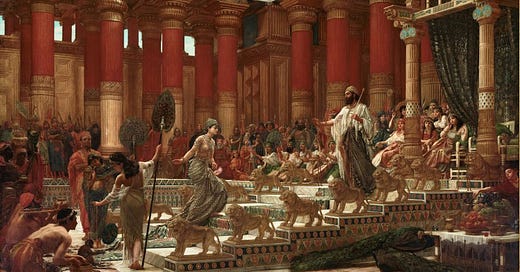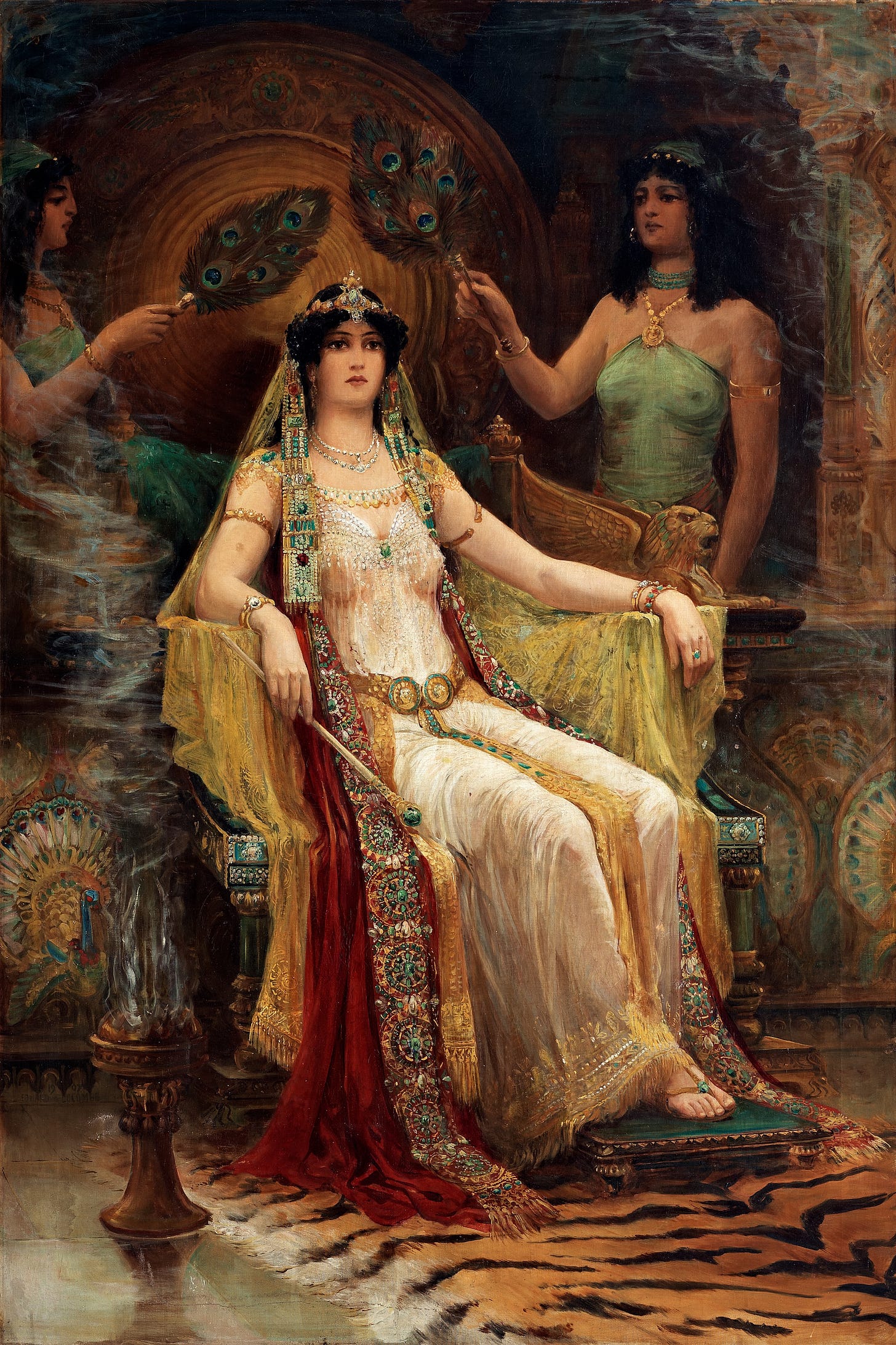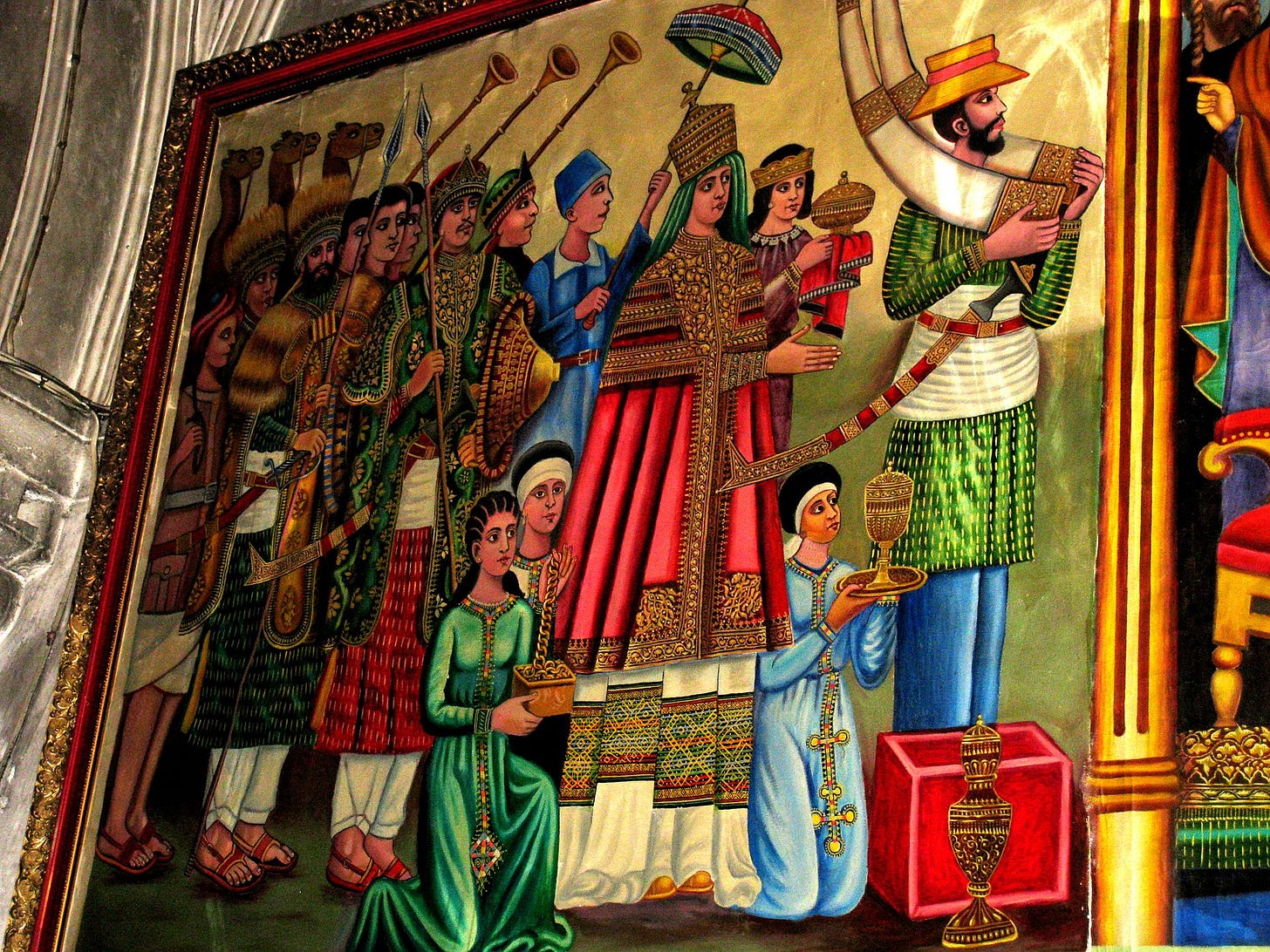What would make a Queen leave her throne, cross two thousand kilometres of burning sand, and front up at the palace of a far-away King to present him with treasures untold?
The answer is: wisdom.
The Queen, who likely hailed from somewhere near modern-day Yemen, was one of the wealthiest and powerful people in the world. She was, in our terms, in the Bezos and Musk bracket.
But when she heard about Solomon and his relationship to the Lord, she knew that she was lacking. There was a longing in her heart that all the status, wealth, and power could not answer. She came to test Solomon with hard questions – because she knew his special connection to the Lord gave him knowledge that she couldn’t find anywhere else.
We can imagine what the questions were. What is the purpose of human life? Why is the suffering and evil? What is the meaning of beauty? What does it mean to lead a good life?
She came with a great caravan—not just for comfort or protection, but bearing gifts fit for a king. Her offerings of gold, worth hundreds of millions today, and her unparalleled gift of spices were a tribute to the value she placed on true wisdom.
What lengths are you willing to go to seek the truth? The Queen can see through the illusion of success. She knows how hollow it ultimately is. She knows that there’s a deeper treasure – not one that is cheap of convenient, but one that demands a long, costly journey.
And you have to give it to her for being honest with herself. In our time, we are too easily distracted by material things and by our carefully curated experiences.
We live in a peculiar age—one of infinite data and constant distraction. We are drowning in information, but starving for meaning. The digital miracle hasn’t answered our deepest questions. It hasn’t touched the longing of the heart.
You can’t google wisdom. Google can’t tell you why, and it can’t tell you who.
You can’t google wisdom
But what about artificial intelligence? Would the Queen, if she was alive today, have saved herself a lot of bother by asking ChatGPT her profound existential questions? Have we finally created not just a knowledge machine but a wisdom machine, that will not just compute data but advise us?
Pondering this, I thought I’d ask ChatGPT: Do you believe that God exists?
The machine gave me a short essay on the arguments for or against. So I asked it again: do you believe that God exists?
That finally got to the point. It said:
I don’t have beliefs or faith like a person does.
Then I thought I’d push it a little further. So I asked ChatGPT, do you love me?
The machine, which sounded a little worried by this question, soothed me by saying that I was worthy of love, but finally said:
I don’t have a heart or soul, so I can’t love the way a person can.
That tells us all we need to know. Whatever wisdom might be, it cannot emerge from an algorithm.
Whatever wisdom might be, it cannot emerge from an algorithm.
Contrast this with what the Queen saw when she met King Solomon in all his splendour, in I Kings 10:3-5:
Solomon answered all her questions; nothing was too hard for the king to explain to her. 4 When the queen of Sheba saw all the wisdom of Solomon and the palace he had built, 5 the food on his table, the seating of his officials, the attending servants in their robes, his cupbearers, and the burnt offerings he made at the temple of the Lord, she was overwhelmed.
There was nothing hidden from the King. He was able to answer her questions by this gift of wisdom he had received. But the Queen is also overwhelmed by what she sees. She is stunned by the beauty, order, and worship of his kingdom. His wisdom is not just in what he says but in the way he lives. She saw how the Solomon’s wisdom was a blessing not just to himself but to his kingdom – that he ruled it with justice and righteousness.
But more than that. The Queen can see where this wisdom comes from. It is not simply that Solomon is a scholar, though he certainly was. All this wisdom points back to the Lord. She sees beyond Solomon to the source. This foreign Queen praises the Lord, whose eternal love is so evident to her.
And she will have done this because of what Solomon would have taught her. We know that the theme of all his wisdom – the fundamental principle and the key statement - is this: The fear of the Lord is the beginning of wisdom.
That is, it was Solomon’s relationship with the creator of the universe that made him wise. Without this, everything else is just data or advice. All true wisdom begins and ends with God. Every art, every science—wherever it reflects what is true, good, and beautiful—bears witness to him. The Queen of Sheba shows herself wise when she praises Solomon’s God, and when she makes her great tribute to Solomon, which went to make even more beautiful the temple of the Lord in Jerusalem.
The Queen of Sheba travelled far because she knew what all her splendour could not give her. And when she found the source of wisdom, she didn’t merely admire it—she worshipped.
And now, says Jesus, “Something greater than Solomon is here.”
We no longer need to cross deserts or courts to find wisdom. Wisdom has come to us, not as a proverb, not as a principle, but as a person—crucified, risen, and reigning. Jesus Christ is the wisdom of God. Not a machine, but a man. Not a programme, but a presence. Not an algorithm, but a Saviour.
So ask—and it will be given to you. Seek—not just knowledge, but Him, and you will find. Knock—on the door of the Kingdom of the King even greater than Solomon himself.
Almighty God,
you are the source of all true wisdom and the giver of every good gift:
Grant us grace, like the Queen of Sheba,
to seek you with honest hearts,
to bring before you our questions and our praise,
and to recognise in your Son, Jesus Christ,
the wisdom that leads to life eternal;
through the same Jesus Christ our Lord,
who lives and reigns with you and the Holy Spirit,
one God, now and for ever.
Amen.







So good 👌🏼